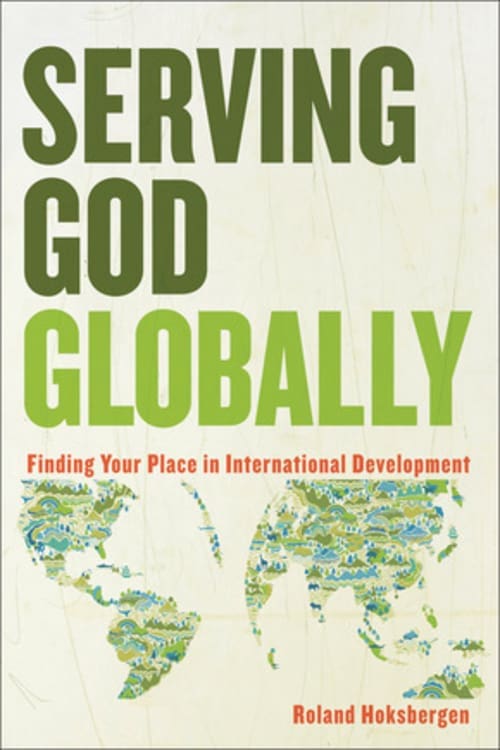Serving God Globally: Finding Your Place in International Development by Roland Hoksbergen. Baker Academic, 2012. 240pp.
In the introduction to Dr. Roland Hoksbergen’s Serving God Globally: Finding Your Place in International Development, the author comments that “signing up for this mission will require lots of study, lots of personal growth, and lots of practice.” The book is written on this premise, recognizing that effective work in international development necessitates a complex understanding of the discipline in order to create actual change. Indeed, what sets Hoksbergen’s book apart is his ability to connect scholarship and faith. Many books have tackled these issues separately, but it is rare to find a piece that so articulately and intelligently speaks to the need for faith-driven development practice that is still enriched with a strong understanding of international development discourse. While faith can be an important motivating factor for wanting to help the world’s poor, such faith must be coupled with a robust understanding of the complexities of international development to be as effective as possible. Hoksbergen demonstrates his knowledge of this reality throughout the book, weaving practical examples with theoretical underpinnings to illustrate that practice void of theory misses a key component to the struggle for poverty alleviation.
Hoksbergen uses direct data collection to demonstrate the unique challenges and opportunities accompanying work in international development. He seeks to use firsthand knowledge to answer any questions that students probably have, including: “I want to help, but what do I have to offer?” and “Is there a career here?” and “Will I have to live in a developing country? Am I cut out to do that?” These are questions that students almost always have, but are often too embarrassed to ask. By issuing these questions and setting out to provide answers through the words of those working in development, Hoksbergen enables the student to feel more comfortable thinking about their role in this line of work.
However, the author does not stop at these practical questions. While he does answer questions pertaining to how a student might begin preparation for work in this field, including a chapter devoted to naming institutions and universities with relevant degrees, he also presses his reader to think about more overarching questions including, “Why are people poor, and what strategies to help actually work? What is God’s plan for people in this world, and what does development really mean? Is there any hope for change when the problems seem so big and intractable? Can foreigners, maybe someone like me, really help?” Questions like these force students to view development beyond their own internal lenses. By asking them, readers are forced to think beyond what working in development means for themselves to what work in development means for the so-called beneficiary of the practice, a point which too frequently goes overlooked.
Christians especially must work hard to move beyond the critiques of the failed trickle-down, one-sided models of development popularized during colonization. By pressing students to think about what impact their practices would have on the communities and countries in which they are working, the reader is challenged to see development as an exercise that truly does influence change—and not always for the better. This book presents, in very approachable prose, the four most widely recognized theories of development—modernization, dependency, post-development, and the capabilities approach—and in doing so, shows that there are very distinct ways in which organizations and individuals have historically sought to bring about development. Hoksbergen brilliantly presents these in such a way that the reader is clearly able to understand how one’s own viewpoint or theory shapes what practices of development are undertaken and why, and consequently accomplishes the difficult task of convincing students that theory is relevant. By providing a better understanding of the varying ways development is undertaken, the book also makes a compelling case for the necessity of studying international development prior to working in the field.
Indeed, Hoksbergen uses his book to persuade the reader that development is done most effectively when it is coupled with a holistic understanding of the intricacies of the practice. In a world where philanthropy seems to have become in vogue, it is becoming increasingly difficult to show that good intentions do not always lead to good results. This book is about international development as a discipline, clearly demonstrating that practice void of theory can miss the complexities necessary for changing communities for the better. As any development scholar recognizes, working in a community necessitates a strong understanding of the practice to be undertaken and also of the community itself. Understanding the history, the culture, the socio-economic framework and, very importantly, the needs of the community is paramount to doing work that is both meaningful and dignifying to the community.
By placing the emphasis on the fact that development is ultimately about people’s lives, Hoksbergen reminds his intended audience, students, that international development must be thoughtful lest we harm other individuals. What is more, by placing this within the context of Christianity, he ensures that these future development practitioners recognize that to truly answer God’s calling to work in the field, one must not only be prepared to go wherever God sends them, but to work in a way that brings dignity and hope wherever they are. He says, “Christian development organizations often focus on building community by strengthening relationships of love and care and responsibility within the community.” For Hoksbergen, development is a commitment that requires time, patience, and, above all, a robust understanding of the people involved.
Hoksbergen recognizes development is an imperfect establishment and he does not speak of the future of development in idealistic terms, despite his confidence that we can learn from the mistakes of the past. While he thoughtfully critiques development as an institution, he reminds students that through learning and experience, rooted in their faith, they can succeed in improving the lives of others throughout the world with informed development practices.
Hoksbergen ends his book by admonishing students to use their college years to not just learn in the classroom but to explore who they are as individuals. He provides an long list of resources that will enable these student readers to explore the area of international development further—including websites, institutional names, and schools with degrees related to the discipline—for both American and Canadian readers. Drawing from Paul’s teachings, Hoksbergen reminds the student reader to use critical thinking skills to test everything. He also moves the reader to consider some of the challenges that will inevitably arise once they have completed college and enter the development field. His focus on “keeping body, soul, family, and community together” is of particular value for the student thinking about pursuing this type of career. As those working in this profession can attest to, development is more than a career; it is a calling and a life choice in which it is easy to become disenchanted, fatigued, or overwhelmed. By offering practical advice for ensuring that healthy, solid boundaries are kept, Hoksbergen is working to ensure that the future generation of development practitioners is knowledgeable and grounded.
Hoksbergen ends by speaking from Philippians: “It is God who works in you to will and to act in order to fulfill his good purpose” (Philippians 2:13). This concludes the book with a tone that focuses the reader inward, questioning how one might use the knowledge acquired in this book to fulfill God’s “good purpose.” Christians working in international development have a unique opportunity to reverse the poverty cycle, but in a manner that is honourable to God; indeed, for Christians, this is the only way that development can ever truly be achieved.
There are a myriad of books on international development discourse and practice, and there are, likewise, a multitude of books that discuss Christian work overseas. There are, rather unfortunately, merely a handful of books that link these two topics. Hoksbergen has presented a book that is challenging for Christians yet true to the discipline of international development. Any student reading this book will develop a much greater understanding of the discipline, the importance of its study, and the reality of its practice. If the future of international development in the hands of the Christian students reading this book, I remain hopeful about what is yet to come.


